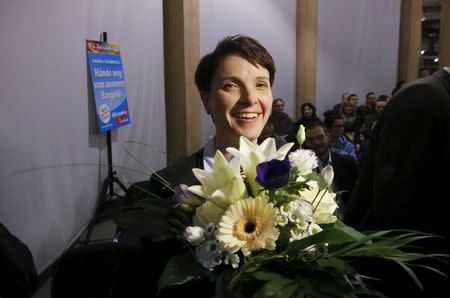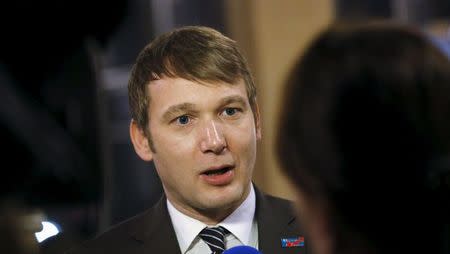Church-going chemist gives German anti-immigrant party a 'friendly face'
By Michelle Martin BITTERFELD-WOLFEN, Germany (Reuters) - Frauke Petry has been fiercely ambitious since her schooldays. Now the church-going chemist also has high ambitions for the political party she heads, the Alternative for Germany, and her weapon is the refugee crisis. On her long path to becoming "the friendly face" of the right-wing AfD, Petry passed her school exams with flying colors, trained as an organist and choir director, gained a doctorate and founded a firm to make an environmentally-friendly plastic filling used in tires. Since last summer, the estranged wife of a Lutheran pastor has transformed the AfD from an anti-euro group on the brink of collapse into an anti-immigrant party tipped to win up to a fifth of the vote in regional elections next weekend. Along the way she has drawn criticism by suggesting that migrants entering Germany illegally should be shot if necessary. Undaunted, 40-year-old Petry is setting her ambitions yet higher as Germany experiences a record influx of migrants. Her aim is to get the AfD into the Bundestag, the lower house of parliament, in the 2017 federal election - no small feat for a woman who entered politics only in 2013 when the AfD was founded. "First of all we need to work towards controlling the borders and deporting a lot of people who are in Germany without having the right to be here," Petry told Reuters in Bitterfeld-Wolfen, an industrial town in the eastern state of Saxony-Anhalt that votes on March 13 along with two western states. Such comments go down well with a growing number of Germans who fear they are being inundated by foreigners after 1.1 million migrants arrived last year under Chancellor Angela Merkel's open door policy. A poll for broadcaster ARD showed support for the AfD in Saxony-Anhalt at 19 percent, a result that would make it the third strongest party there after Merkel's Christian Democrats and the far-left Linke. It also showed the AfD was likely to win seats in the parliaments of Baden-Wuerttemberg and Rhineland-Palatinate with 13 percent and 9 percent of the vote respectively. Such popular support for a party fiercely opposed to Merkel's refugee policy is deepening unease among Germany's mainstream parties. HELPFULNESS, CHARITY AND THE LAW Petry, who announced last year she had separated from her husband and entered a relationship with a regional AfD leader, says she takes her children - she has four - to church. Christianity is important to her, but she believes morals should not be above the law. "We shouldn't lose sight of the things that drive us in private like helpfulness and charity but we also need to respect German and European laws," she said, sporting a winter coat over her trademark dark trouser suit and light blue blouse. Despite the poll readings, political scientist Gero Neugebauer believes the AfD is not as strongly anchored in society as France's National Front, whose leader Marine Le Pen is likely to be a frontrunner in a 2017 presidential election. Neugebauer of Berlin's Free University regards the AfD, which has around 21,000 members, as a "peanut" in size and says its program is too limited to appeal to all parts of society. After winning a leadership battle with AfD founder Bernd Lucke last July, Petry is now co-leader and the most prominent face of a party that wants to stop accepting migrants until the European Union has secured its external frontiers. To Thomas Jaeger, a political scientist at Cologne University, Petry stands out from other senior German right-wingers who are old and male. "She gives a friendly face to a right-wing populist party that is, in parts, extreme right-wing and that's what makes her dangerous," he said of Petry, who is rarely seen without a broad smile. All this seems to be working. At the AfD campaign rally in Bitterfeld-Wolfen, workman Udo Pfeffer, 48, said Petry seemed to be a "nice" person. That seems remarkable in light of her comments on shooting migrants entering Germany illegally. Saxony-Anhalt once lay on East Germany's border with the West where guards were under orders to shoot anyone trying to escape the communist state. Petry herself was born and lived in the east until she moved as a 14-year-old to the western industrial Ruhr area. After studying chemistry in Britain and gaining her doctorate in the west German town of Goettingen, she moved back to the east, setting up in Leipzig the firm selling ecological plastic in 2007. Her critics include former colleagues like Hans-Olaf Henkel, who left the AfD in 2015 to join the Alliance for Progress and Renewal (ALFA), a group for voters unhappy both with what he called a move to the left by Merkel's conservatives and the AfD's shift to the right. He says Petry and her party have surged only because of Merkel's "fatal" refugee policies. "(Petry) has always behaved like the party itself - she's always where the majority happens to be at the time and that's why she has now chummed up with the right-wing extremists with the 'order to shoot'," he said. But for some voters like Falko Wendt, unhappy with Merkel's refugee policy, Petry seems like the best bet. "She's doing a good job. She's a smart lady and she knows what she wants - she's the right person to lead the AfD at the moment," the 46-year-old said. (editing by David Stamp)




